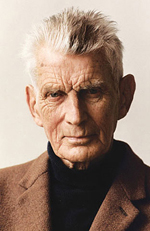About Samuel Beckett
 Samuel Beckett, an Irishman born in Dublin in 1906 who later made Paris his adopted home, died in his eighty fourth year in 1989. He produced an enormous body of critically acclaimed work, novels, short stories, criticism, poetry, drama, written in two languages - English and French - and in his later years came quite unexpectedly to be regarded as the most influential and unconventional playwright of the twentieth century. In 1969 he was awarded the Nobel Prize in Literature. The Award Ceremony speech summarized his unique contribution to world literature in the following terms:
Samuel Beckett, an Irishman born in Dublin in 1906 who later made Paris his adopted home, died in his eighty fourth year in 1989. He produced an enormous body of critically acclaimed work, novels, short stories, criticism, poetry, drama, written in two languages - English and French - and in his later years came quite unexpectedly to be regarded as the most influential and unconventional playwright of the twentieth century. In 1969 he was awarded the Nobel Prize in Literature. The Award Ceremony speech summarized his unique contribution to world literature in the following terms:
...the degradation of humanity is a recurrent theme in Beckett's writing and to this extent, his philosophy, simply accentuated by elements of the grotesque and of tragic farce, can be described as a negativism that cannot desist from descending to the depths. To the depths it must go because it is only there that pessimistic thought and poetry can work their miracles. What does one get when a negative is printed? A positive, a clarification, with black proving to be the light of day, the parts in deepest shade those which reflect the light source. Its name is fellow- feeling, charity...
~ Presentation Speech by Karl Ragnar Gierow, of the Swedish Academy, 1969.
CSU is to be commended for a curriculum that allows such investigations, especially to undergraduates. The Beckett Center is a most unique valuable resource, one to be treasured.
~ Andrei Belgrader (award-winning theatre director, formerly head of the directing program at the Juilliard School, Cal Arts, and UC Los Angeles.)

